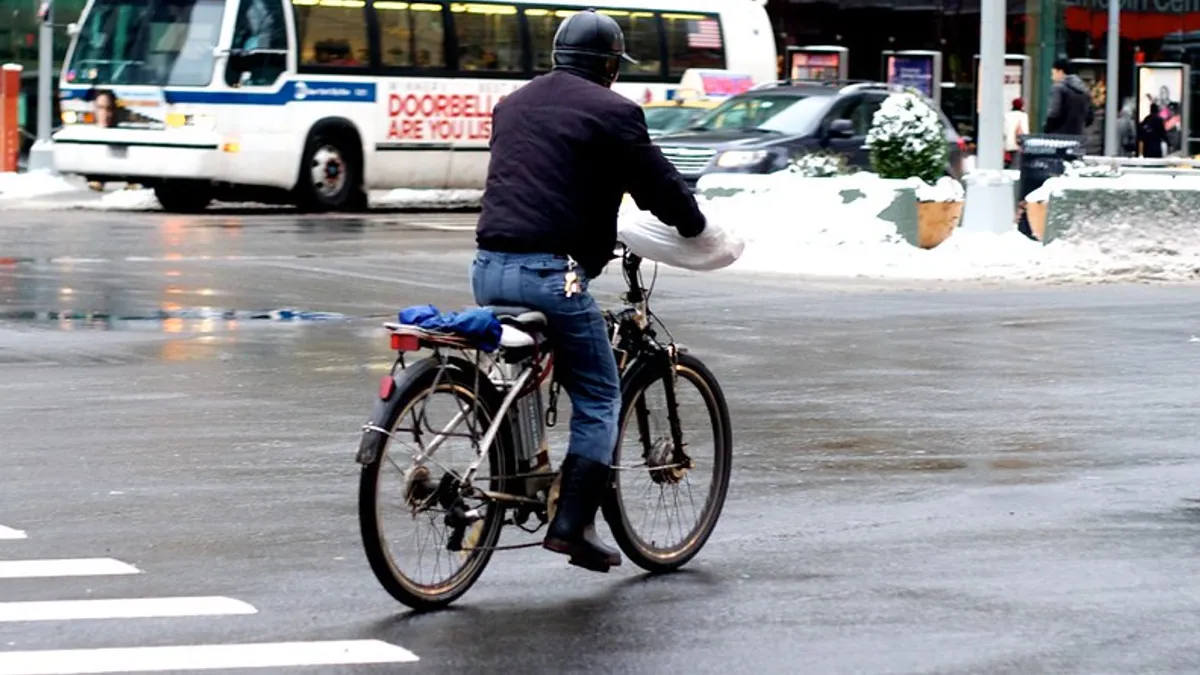Dive Brief:
- The New York State legislature on Thursday approved Gov. Andrew Cuomo's policy proposal to legalize e-bikes and e-scooters statewide, which will be part of the new fiscal year budget bill. The legislative chambers are slated to continue debating the budget bill on Friday afternoon before it's finalized, according to LocalSYR.com.
E-bikes & e-scooters are now legal in New York via the budget! Our frontline workers can now safely ride to work or deliver food to our neighbors w/o fear of ridiculous fines & penalties. @nily & I have fought to #DeliverJustice for over a year—I’m excited for our communities! pic.twitter.com/xObNZU7bLU
— Jessica Ramos (@jessicaramos) April 2, 2020
- The budget language, which advocates say is very similar to a separate bill Cuomo vetoed late last year, allows the electric vehicles — including those used by delivery workers — to operate across the state, and reportedly gives local governments the ability to regulate their use further.
- Scooters will have speeds capped at 15 mph, while there will be three classes of e-bikes created: pedal-assisted with no throttle; throttle-assisted with a maximum speed of 20 mph; and throttle-powered with a maximum speed of 25 mph. Riders of the latter class of e-bike would be requited to wear a helmet, according to Streetsblog.
Dive Insight:
For years, delivery workers and residents across the state, and particularly in New York City, have been penalized for the use of electric vehicles to more quickly get across town. While some officials have been hesitant to approve the vehicles due to safety concerns, others like Sen. Jessica Ramos have been vocal about the need for this alternative method of mobility.
"If we want to move into the future, we need to jump onto the next available scooter heading there," Ramos wrote in a 2019 BuzzFeed News opinion piece, noting that electric vehicles would enable the state and city to foster "economic growth, sustainability, accommodated density and livability through access to mobility."
With yesterday's legalization of the vehicles, Ramos is now celebrating, as are dockless bike and scooter operators. Bird shared news of the legalization on its Twitter account, while Lime called the move a "major step forward"
"E-bikes and e-scooters are valuable transportation options that will benefit communities across the state," a Lime spokesperson told Smart Cities Dive in an email. "Especially during this challenging time, micromobility is best suited to help New Yorkers get where they need to go. We applaud the delivery worker coalition for leading this decade-long charge to help bring more sustainable, convenient transportation to New York cities."
The new coronavirus (COVID-19) has forced cities to reconsider mobility options as they try and keep people off public transit to prevent the spread of the pandemic, and as ride-hailing companies have also scaled back their operations. That need to stop the spread has been especially acute in New York, which has emerged as an epicenter of the pandemic.
Despite this step forward in legislation, there is no guarantee micromobility operators will survive what has been an enormously disruptive time in their industry. Lime suspended its service in all its North American markets and 22 countries in mid-March, while Bird has made similar efforts by removing its vehicles from San Francisco and select European cities. As other operators weigh whether to withdraw or keep their vehicles on the streets, they will continue to face questions around financial viability, especially as ridership craters in the face of social distancing policies.












